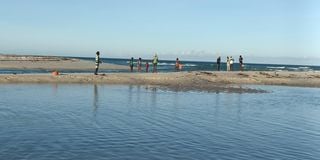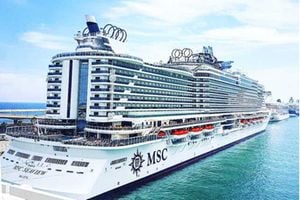
Holidaymakers stand at a spot where the river joins the Indian Ocean at Kongo Beach in Diani, Kwale County on April 7, 2024. The estuary is a unique feather where water from the river drains into the ocean.
As the waters from the Kongo River in Kwale County meet the Indian Ocean tides at an estuary in Kongo Beach to form a brackish mixture, a culture clash reveals itself.
Normally, public beaches across Kenya’s coastal region are known for being recreational areas where diverse cultures meet for various activities.
In Diani, Kwale County, the pristine, serene beaches with snow-white sands are among the major attractions where local and international tourists meet for leisure, swimming, weddings as well as water sports.
Kongo Beach, which is part of Diani, is however exceptional. Besides being a beach, it hosts an ancient mosque that dates back to the 14th century, remaining a key historical symbol for the Muslim faithful despite its age.
Every Friday, and on special days observed by the religion, the faithful fill the Kongo Mosque to conduct their prayers, often spilling over into the sandy beach because of the high number of people occupying the premises.
Hundreds of holidaymakers also visit the beach to watch the magnificent sunset at Kongo River.
Custodians of the adjacent Kongo Mosque have been at pains to convince those visiting the beach to respect Islamic culture, mostly with little success.
For instance, at the entrance of the mosque, there is a signboard that warns, "Alcohol, nudity and loud music is not allowed".
To ensure that the moral standards are adhered to, the mosque’s custodians camp outside the main entrance to Kongo Beach, checking whether the visitors are ‘well dressed’, with their point of reference being Islamic beliefs on morality.
“We ask the visitors to respect our culture. That means that even though they are going to swim, they should cover themselves up and only change once they get to the water,” said one of the custodians who preferred to remain anonymous.
Restaurants along the beach have also been restricted from selling alcohol and its products. Meat products restricted in Islam such as pork are also not sold.
But Nation.Africa has learnt that a few of the visitors still manage to sneak drinks into the area, mostly consuming them secretly or at night in the absence of the mosque’s custodians.
According to Sheikh Hamisi Suleiman, a religious leader and deputy Imam at the Kongo mosque, the mosque is a holy place hence the need for tough rules for those moving around the compound.
He said the name of the mosque came from one of the stones outside the mosque which were written ‘Saddiq Kongo’. Muslims believe it is the grave of one of the earliest custodians.
“We have been trying to make this a ‘halal’ mosque for the longest time and most of the frequent visitors are now aware of this. The beach attracts people of different cultures, so the only restriction would be that they also respect our religion,” he said.
At the moment, construction of an extension of the mosque towards the beach is ongoing, which Sheikh Suleiman said was a result of the increasing number of people who prefer holding their prayers at Kongo Mosque.
To keep its ancient look, the extension is built using coral stones.
Recently, the county government announced that it plans to step in and make the area a 'halal beach', a move which if implemented would require visitors to adhere to strict Islamic cultures such as no alcohol or semi-nudity. It is expected that this would be protected under the county’s by-laws.
According to the custodians, the county’s move to make Kongo Beach ‘halal’ should however not interfere with their activities, since it has been their responsibility to take care of the mosque and its surrounding compound for the longest time.
Kwale Governor Fatuma Achani said this would help to accommodate a wider population from around the world through religious tourism.
“We are optimistic in developing Kongo Beach into a ‘halal beach’ to boost religious tourism,” said Ms Achani.
A ‘halal beach’ means that the activities conducted are in accordance with Muslim doctrines, including the food served, lifestyle, behaviour, and other services that cater to Muslim travellers.
In many cases, 'beach' and 'halal’ would not fit in the same sentence especially when beaches are mostly associated with people in skimpy attire whose longing is to bathe in the sun, sand and ocean.
Kwale County Executive Committee Member (CEC) for Tourism Michael Mutua, said through the transformation and development of Kongo Beach as ‘halal’, they are hoping to attract more visitors from the Middle East where the majority are Muslims.
“Diani has won awards for being the best beach in Africa consecutively. That is why we are coming up with measures that can accommodate all types of tourists from around the world. Kongo Beach is among our biggest priorities,” said Mr Mutua.
Tourism stakeholders in the county welcomed this proposal, saying it would diversify tourism attractions.
However, the Kenya Association of Hotelkeepers and Caterers (KAHC) Kwale Chairperson Kioko Musyoki said there must be efforts in place to make all stakeholders understand what the concept is all about.
"We would only need to understand what ‘halal’ means so that there is no clash. But this will be a good way of adding a portfolio to what exists in Diani," he said.
Kwale County Spokesperson Nicky Gitonga noted that among the things that will be restricted will be alcohol consumption, which is common among some beaches.
The county government is also set to improve amenities such as changing rooms for men and women.
Kongo Beach remains one of the most loved beaches in Diani, with huge baobab trees providing cool shades and also having one of the most magnificent views of the sunset from the hills to the West.







